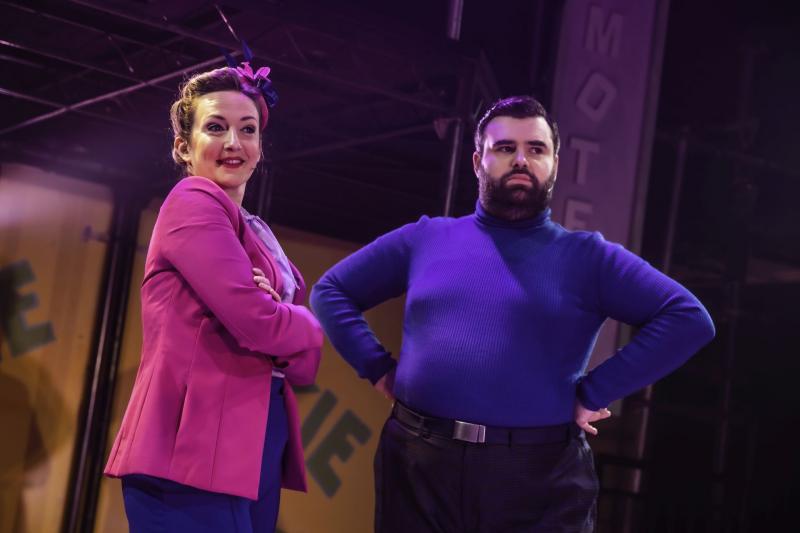Anyone Can Whistle, Southwark Playhouse review - full-on bonkers | reviews, news & interviews
Anyone Can Whistle, Southwark Playhouse review - full-on bonkers
Anyone Can Whistle, Southwark Playhouse review - full-on bonkers
Niche Sondheim gets an, um, no-trumpets-barred revival

Musicals don't get madder than Anyone Can Whistle, the 1964 Broadway flop from onetime West Side Story and Gypsy collaborators Stephen Sondheim and Arthur Laurents which makes history of sorts at Southwark Playhouse as the first Sondheim show to be revived since his death last year, age 91.
I for one began proceedings with a grin on my face, prompted largely by some thrilling vocals from Alex Young as Cora Hoover Hooper, the mayoress of a town badly in need of a miracle (main picture: Alex Young and Danny Lane). But as Laurents's book burrows its echt-1960s way into territory that throws questions of sanity up for grabs and seems pitched somewhere between Marat/Sade and Rowan and Martin's Laugh-In, I began to thirst for a curative dollop of quiet or nuance or something of that sort.
 Instead, Rankcom's approach seems to be to come out all guns firing – or should that be all trumpets blaring given an often-thrilling score (known to Sondheim devotees from many starry concert performances over time and even the odd fringe revival here) that includes the military-sounding "There Won't Be Trumpets", cut during previews but now inextricably linked to this show. Someone somewhere is sure to write a PhD thesis about the lyrical emphasis on brass instruments in 1960s musicals ("Cornet Man" from Funny Girl, "I'm A Brass Band", from Sweet Charity), not to mention a collective interest in parades: Funny Girl, premiered on Broadway the same year, again features in this category ("Don't Rain on my Parade"), whilst Whistle includes the Mayoress's anthemic "There's A Parade In Town". Not to be outdone is "Before the Parade Passes By", again first heard in 1964, on that occasion in Hello, Dolly!
Instead, Rankcom's approach seems to be to come out all guns firing – or should that be all trumpets blaring given an often-thrilling score (known to Sondheim devotees from many starry concert performances over time and even the odd fringe revival here) that includes the military-sounding "There Won't Be Trumpets", cut during previews but now inextricably linked to this show. Someone somewhere is sure to write a PhD thesis about the lyrical emphasis on brass instruments in 1960s musicals ("Cornet Man" from Funny Girl, "I'm A Brass Band", from Sweet Charity), not to mention a collective interest in parades: Funny Girl, premiered on Broadway the same year, again features in this category ("Don't Rain on my Parade"), whilst Whistle includes the Mayoress's anthemic "There's A Parade In Town". Not to be outdone is "Before the Parade Passes By", again first heard in 1964, on that occasion in Hello, Dolly!
Rankcom's approach to a story that pits the gleaming-eyed Mayoress against the reason-loving Fay Apple, a psychiatric nurse with an evident penchant for French, is to put everything on overdrive, amplified (very literally so) by striking new orchestrations from Charlie Ingles for musical director Natalie Pound's hard-working five-piece band. The cast, by contrast, might deliver more likably as the evening goes on if they weren't trying quite so forcefully, and the efforts to bring the audience into the mix seem a misguided attempt to roll over into this show the question asked of us at the end of Sweeney Todd: "Isn't that Sweeney there beside you?"
Indeed, a photo in the programme finds company member Nathan Taylor ("happy with any pronoun", he indicates next to his bio) striking a Sweeney-esque pose, even if the response of that 1979 Sondheim anti-hero to the shenanigans on view here would be to make them into so many meat pies. Or, perhaps, cookies, to co-opt the name given the denizens of the local mental asylum known as "the cookie jar". I'd love to know what psychedelics were at metaphoric (or even actual) play at the time to deliver "Come Play Wiz Me", a lunatic duet for a wigged Nurse Apple (Chrystine Symone, pictured above with Broatch) and her putative amour, Hapgood, who is given a Pippin-esque vibe (another show about that delights in the zany) by Jordan Broatch, who on this evidence would be perfect casting if and when Timothee Chalamet's life story itself becomes a stage musical. (Well, Anyone Can Whistle is here to remind us that shows can spring from anywhere, right?) The bright, brash designs suggest a comic book come to life, which may not be a helpful comparison to bring to mind.
A musical that crowns a "king and queen of madmen" needs someone akin to Ionesco to lend a proper surrealist throughline, though Ibsen gets referenced via Peer Gynt not once but twice. And Sondheim completists will note a beaming comment voiced by Broatch to "being alive" even if Company, the show containing the song of that very title, seems galaxies away from this belligerently counter-culture confection that leaves you humming many a notable tune and tapping your feet in impatience at the same time.
The future of Arts Journalism
You can stop theartsdesk.com closing!
We urgently need financing to survive. Our fundraising drive has thus far raised £49,000 but we need to reach £100,000 or we will be forced to close. Please contribute here: https://gofund.me/c3f6033d
And if you can forward this information to anyone who might assist, we’d be grateful.

Subscribe to theartsdesk.com
Thank you for continuing to read our work on theartsdesk.com. For unlimited access to every article in its entirety, including our archive of more than 15,000 pieces, we're asking for £5 per month or £40 per year. We feel it's a very good deal, and hope you do too.
To take a subscription now simply click here.
And if you're looking for that extra gift for a friend or family member, why not treat them to a theartsdesk.com gift subscription?
more Theatre
 Ragdoll, Jermyn Street Theatre review - compelling and emotionally truthful
Katherine Moar returns with a Patty Hearst-inspired follow up to her debut hit 'Farm Hall'
Ragdoll, Jermyn Street Theatre review - compelling and emotionally truthful
Katherine Moar returns with a Patty Hearst-inspired follow up to her debut hit 'Farm Hall'
 Troilus and Cressida, Globe Theatre review - a 'problem play' with added problems
Raucous and carnivalesque, but also ugly and incomprehensible
Troilus and Cressida, Globe Theatre review - a 'problem play' with added problems
Raucous and carnivalesque, but also ugly and incomprehensible
 Clarkston, Trafalgar Theatre review - two lads on a road to nowhere
Netflix star, Joe Locke, is the selling point of a production that needs one
Clarkston, Trafalgar Theatre review - two lads on a road to nowhere
Netflix star, Joe Locke, is the selling point of a production that needs one
 Ghost Stories, Peacock Theatre review - spirited staging but short on scares
Impressive spectacle saves an ageing show in an unsuitable venue
Ghost Stories, Peacock Theatre review - spirited staging but short on scares
Impressive spectacle saves an ageing show in an unsuitable venue
 Hamlet, National Theatre review - turning tragedy to comedy is no joke
Hiran Abeyeskera’s childlike prince falls flat in a mixed production
Hamlet, National Theatre review - turning tragedy to comedy is no joke
Hiran Abeyeskera’s childlike prince falls flat in a mixed production
 Rohtko, Barbican review - postmodern meditation on fake and authentic art is less than the sum of its parts
Łukasz Twarkowski's production dazzles without illuminating
Rohtko, Barbican review - postmodern meditation on fake and authentic art is less than the sum of its parts
Łukasz Twarkowski's production dazzles without illuminating
 Lee, Park Theatre review - Lee Krasner looks back on her life as an artist
Informative and interesting, the play's format limits its potential
Lee, Park Theatre review - Lee Krasner looks back on her life as an artist
Informative and interesting, the play's format limits its potential
 Measure for Measure, RSC, Stratford review - 'problem play' has no problem with relevance
Shakespeare, in this adaptation, is at his most perceptive
Measure for Measure, RSC, Stratford review - 'problem play' has no problem with relevance
Shakespeare, in this adaptation, is at his most perceptive
 The Importance of Being Earnest, Noël Coward Theatre review - dazzling and delightful queer fest
West End transfer of National Theatre hit stars Stephen Fry and Olly Alexander
The Importance of Being Earnest, Noël Coward Theatre review - dazzling and delightful queer fest
West End transfer of National Theatre hit stars Stephen Fry and Olly Alexander
 Get Down Tonight, Charing Cross Theatre review - glitz and hits from the 70s
If you love the songs of KC and the Sunshine Band, Please Do Go!
Get Down Tonight, Charing Cross Theatre review - glitz and hits from the 70s
If you love the songs of KC and the Sunshine Band, Please Do Go!
 Punch, Apollo Theatre review - powerful play about the strength of redemption
James Graham's play transfixes the audience at every stage
Punch, Apollo Theatre review - powerful play about the strength of redemption
James Graham's play transfixes the audience at every stage
 The Billionaire Inside Your Head, Hampstead Theatre review - a map of a man with OCD
Will Lord's promising debut burdens a fine cast with too much dialogue
The Billionaire Inside Your Head, Hampstead Theatre review - a map of a man with OCD
Will Lord's promising debut burdens a fine cast with too much dialogue

Add comment